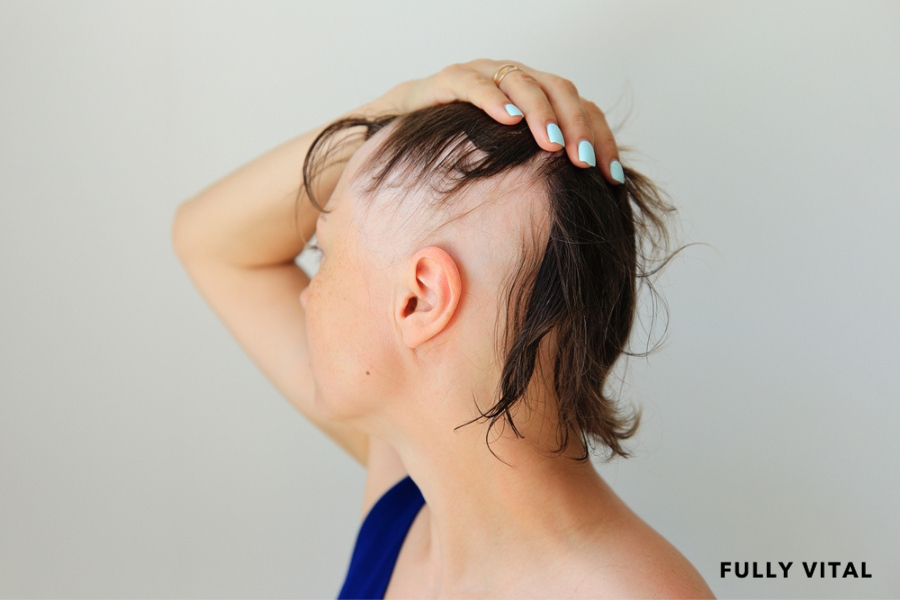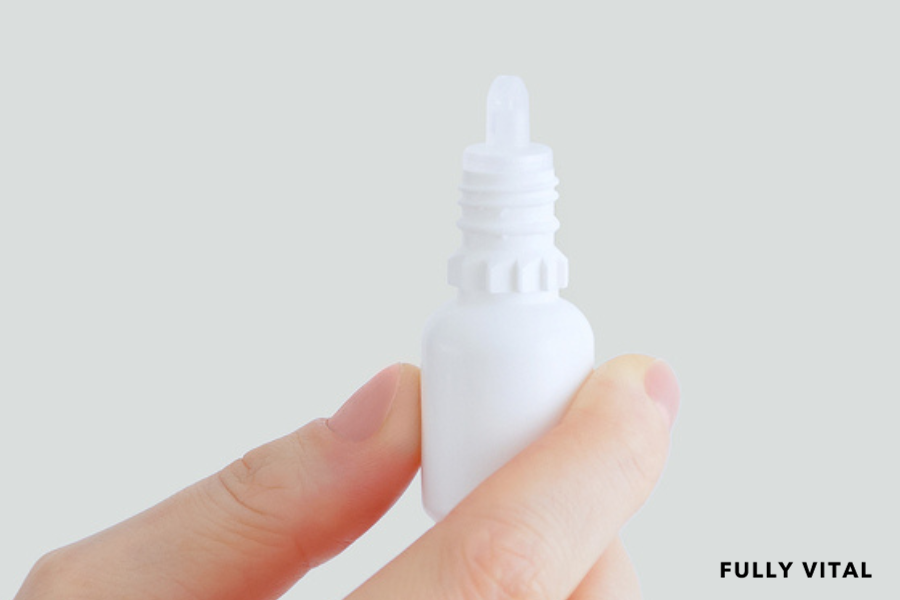
Unlocking The Secrets Of Folliculitis Decalvans: A Guide To Healthy Hair Growth
In our quest to provide comprehensive information on hair-related topics, we delve into the intricacies of folliculitis decalvans.
This condition, though not widely known, can have a significant impact on hair growth.
Let's explore what folliculitis decalvans is, why it's crucial to understand it, how it occurs, its benefits when treated, potential downsides of treatment, and alternatives.
Our primary audience, women of all hair types seeking to stimulate hair growth, will find this conversational guide valuable.

I LOVE MY HAIR NOW
FullyVital hair serum and hair vitamins made tremendous improvements in my hair. I truly love my hair now.
Dorit S.,
What Is Folliculitis Decalvans?
Folliculitis decalvans, often abbreviated as FD, is a rare but troublesome hair disorder.
It primarily affects the hair follicles, leading to inflammation, scarring, and hair loss.
This condition can be frustrating and concerning for anyone experiencing it, especially for women seeking to maintain or regain their luscious locks.

Why Is Understanding Folliculitis Decalvans Important?
Understanding folliculitis decalvans is crucial because knowledge is the first step towards effective management.
By learning about the causes, symptoms, and treatment options, individuals can make informed decisions about their hair care journey.
Ignoring FD can lead to worsening symptoms and further hair loss.
How Does Folliculitis Decalvans Occur?
Folliculitis decalvans occur when hair follicles become inflamed due to bacterial or fungal infections.
These infections trigger an immune response in the body, leading to hair loss and the formation of pustules, nodules, or scars on the scalp.
This condition can be painful and emotionally distressing.1
What Are The Benefits Of Treating Folliculitis Decalvans?
Treating folliculitis decalvans offers several benefits, such as:
Hair Regrowth
Effective treatment can halt the progression of FD and, in some cases, promote hair regrowth.
Pain Relief
Managing inflammation and infection can alleviate the discomfort associated with FD.
Improved Confidence
Restoring hair can boost self-esteem and confidence, particularly for women who value their hair's appearance.
Are There Any Downsides To Folliculitis Decalvans Treatment?
While treatment for FD can be beneficial, it's essential to be aware of potential downsides, including:
- Treatment Duration: Some treatments may require a long-term commitment, which can be inconvenient.
- Side Effects: Medications used to treat FD may have side effects, which should be discussed with a healthcare provider.
- Cost: The cost of treatment can vary, and not all options may be covered by insurance.
What Are The Alternatives To Folliculitis Decalvans Treatment?
In cases where treatment for folliculitis decalvans may not be suitable or desired, there are alternative approaches to consider, such as:
- Hairstyling: Creative hairstyling techniques can help conceal hair loss.
- Wigs and Hairpieces: High-quality wigs or hairpieces can provide a natural appearance.
- Supportive Care: Maintaining scalp hygiene and using gentle hair products can minimize symptoms.
What Triggers Folliculitis Decalvans?
Folliculitis decalvans can be triggered by various factors, including:
Bacterial and Fungal Infections
Infections of the hair follicles are a primary trigger for this condition.
Immune Response
An abnormal immune response can contribute to the development of folliculitis decalvans.
Hormonal Imbalances
Some cases may be linked to hormonal changes, although this is less common.
Genetic Predisposition
There may be a genetic component, as it can run in families.
Stress and Trauma
Emotional stress or physical trauma to the scalp may exacerbate or trigger symptoms.
Is Folliculitis Decalvans Curable?
Folliculitis decalvans is generally not considered curable, but it can be managed with appropriate treatment.2
The goal of treatment is to control symptoms, prevent further hair loss, and manage inflammation.
While a complete cure may not always be achieved, many individuals can experience significant improvement with proper care and ongoing treatment.
What Is The Treatment For Folliculitis Decalvans?
The treatment for folliculitis decalvans typically involves a combination of medical interventions.
Treatment options may include:
- Antibiotics: Oral or topical antibiotics to control bacterial infections.
- Anti-inflammatory Medications: Corticosteroids or other anti-inflammatory drugs to reduce inflammation.
- Immune Suppressants: Medications that suppress the immune system to control the immune response.
- Topical Treatments: Specialized shampoos or creams to manage symptoms and promote scalp health.
- Lifestyle Changes: Adjustments to hair care routines and scalp hygiene.
Will Hair Grow Back After Folliculitis Decalvans?
The possibility of hair regrowth after folliculitis decalvans treatment varies from person to person.
Some individuals may experience partial or complete hair regrowth, while others may see limited improvement.
The effectiveness of treatment depends on factors such as the stage of the condition, the chosen treatment approach, and individual response.
It's essential to maintain realistic expectations and discuss treatment outcomes with a healthcare provider.
In some cases, managing the condition and preventing further hair loss may be the primary goal, while others may achieve significant hair regrowth with the right treatment plan.
What Is The History Of Folliculitis Decalvans?
Folliculitis decalvans has a historical background that sheds light on its significance as a topic for a hair growth product company.
Understanding the history of this condition helps us appreciate its relevance in the context of hair care:
- Ancient References: There are historical references to similar conditions in ancient texts, highlighting the long-standing recognition of folliculitis-related issues.
- Advances in Medical Knowledge: Over time, medical knowledge and diagnostic tools have improved, allowing for better understanding and management of folliculitis decalvans.
- Treatment Evolution: The history of treatment options for FD reflects the ongoing efforts to address this condition, from traditional remedies to modern medical interventions.
What Is The Current Environment Of Folliculitis Decalvans?
To grasp the importance of folliculitis decalvans in the contemporary hair care landscape, we need to consider its current environment:
- Medical Research: Ongoing research is uncovering new insights into the causes and treatment of FD, which may lead to more effective solutions in the future.
- Patient Advocacy: Awareness and advocacy efforts by patients and healthcare professionals are highlighting the impact of FD and the need for improved treatments.
- Market Demand: The demand for products and solutions that address hair loss and scalp conditions, including FD, underscores its relevance in the current market.3
What Is The Future Of Folliculitis Decalvans?
Looking ahead, the future of folliculitis decalvans holds promise and potential challenges:
- Research Breakthroughs: Advances in medical research may lead to innovative treatments and better management strategies for FD.
- Awareness and Education: Increasing awareness about FD and its impact on hair health can empower individuals to seek early diagnosis and treatment.
- Tailored Products: Hair growth product companies have an opportunity to develop specialized products designed to support individuals managing FD.
Unlock The Secret To Timeless Hair With Fully Vital!Discover the transformative power of science-backed hair growth products designed to slow down and reverse the aging of your locks. At Fully Vital, we're on a mission to help you rekindle your love affair with your hair. Our products offer:
Join the Fully Vital family today and embrace the journey to healthier, more vibrant hair! |
Final Thoughts On Folliculitis Decalvans
Understanding and addressing folliculitis decalvans is paramount for anyone looking to maintain a healthy relationship with their locks.
This rare but impactful condition can significantly affect hair growth, self-esteem, and overall well-being.
By delving into its intricacies, from its history to its current landscape and future possibilities, we've shed light on the importance of this topic within the realm of hair care.
At Fully Vital, we are committed to helping you nurture your hair's vitality.
Our range of hair growth products is designed to combat the signs of aging and promote healthier, more resilient locks.
Whether you're managing folliculitis decalvans or simply seeking ways to enhance your hair's longevity, our products are here to support you on your hair care journey.
Explore our product offerings and discover how Fully Vital can be your partner in achieving and maintaining the vibrant, beautiful hair you deserve.
Your locks deserve the best, and we're here to provide it. So, take the first step towards healthier hair today and unlock the full potential of your locks with Fully Vital.
Frequently Asked Questions About Folliculitis Decalvans
Can folliculitis decalvans be cured completely?
No, FD is a chronic condition that can be managed, but a complete cure may not always be possible.
The goal of treatment is typically to control symptoms and prevent further hair loss.
Is folliculitis decalvans contagious?
No, FD is not contagious.
It is caused by inflammation and infection within the hair follicles and is not spread through contact with affected individuals.
Can I prevent folliculitis decalvans?
Prevention measures primarily involve maintaining good scalp hygiene and avoiding factors that may exacerbate the condition, such as harsh hair products or tight hairstyles.
Are there any natural remedies for folliculitis decalvans?
While natural remedies may help soothe symptoms, they are not a substitute for medical treatment.
Consult with a healthcare professional for appropriate treatment options.
How long does it take to see results from FD treatment?
The timeline for improvement varies from person to person.
It may take several months of consistent treatment to see noticeable results, and individual responses can differ.
Can folliculitis decalvans lead to other health problems?
Folliculitis decalvans primarily affects the scalp and hair follicles.
While it can be distressing, it is not typically associated with significant systemic health issues.
However, it's essential to manage the condition to prevent complications and maintain scalp health.
Can folliculitis decalvans lead to permanent baldness?
In some cases, folliculitis decalvans can lead to permanent hair loss due to scarring and damage to the hair follicles.
However, with early diagnosis and appropriate treatment, the progression of the condition can often be slowed or halted, reducing the risk of extensive baldness.
The outcome varies among individuals and depends on the effectiveness of treatment.
Can stress worsen folliculitis decalvans symptoms?
Stress can potentially worsen symptoms of folliculitis decalvans.
Emotional stress can weaken the immune system, making it more challenging to manage the condition.
Managing stress through relaxation techniques and self-care may complement treatment efforts.
Can folliculitis decalvans be mistaken for other scalp conditions?
Yes, folliculitis decalvans can sometimes be mistaken for other scalp conditions, such as acne keloidalis nuchae (AKN) or dissecting cellulitis of the scalp.
These conditions share some similarities in terms of symptoms, including pustules, nodules, and scarring.
A dermatologist or healthcare professional can help differentiate between these conditions through a thorough examination and, if necessary, skin biopsies.
Can I continue using hair styling products and tools if I have folliculitis decalvans?
It's advisable to be cautious when using hair styling products and tools if you have folliculitis decalvans.
Some products and heat styling tools may exacerbate symptoms or cause further irritation to the affected scalp.
Consider using gentle and hypoallergenic hair care products and consult with a dermatologist for recommendations tailored to your specific condition.
Sources:
- Męcińska-Jundziłł, K., Białecka, A., Adamska, U., Kupś-Chmara, G., Grzanka, A., & Czajkowski, R. (2018). Folliculitis decalvans and orofacial granulomatosis. Advances in Dermatology and Allergology, 35(3), 317–319. https://doi.org/10.5114/pdia.2017.70261
- Gautam, S., Mutha, R., Sahu, A. K., Gautam, A., & Joshi, R. K. (2022). Management of folliculitis decalvans with ayurveda- A case report. Journal of Ayurveda and Integrative Medicine, 13(4), 100673. https://doi.org/10.1016/j.jaim.2022.100673
- Nayak, B. S., Ann, C. Y., Azhar, A. B., Ling, E. C. S., Yen, W. H., & Aithal, P. A. (2017). A Study on Scalp Hair Health and Hair Care Practices among Malaysian Medical Students. International Journal of Trichology, 9(2), 58–62. https://doi.org/10.4103/ijt.ijt_76_16







